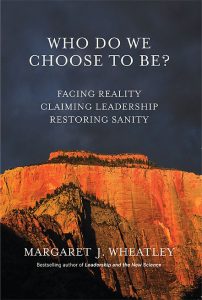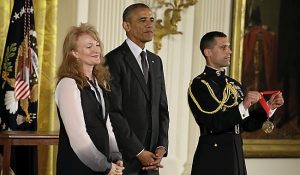 We didn’t elect Donald Trump as our President because we thought he would fix things. We elected him because we knew he would break things. At some point that task will be completed and we will have to start rebuilding. We will have to remove him.
We didn’t elect Donald Trump as our President because we thought he would fix things. We elected him because we knew he would break things. At some point that task will be completed and we will have to start rebuilding. We will have to remove him.
It may take four years when we elect someone else. It may only take until the 2018 elections when we have reconstituted the Congress such that we can impeach him. Or it may come to the awareness of the Republican Party that they cannot allow him to remain in office without doing fatal damage to the party. Indeed, they may have no hope for re-establishing credibility with the American people unless they are willing to protect us from him.
§
Each person has the option of choosing to feel better or to better feel. The more mature option is to allow our pain to teach us about what we need and to motivate us to improve our lives. We use the anxiety to bring our attention to an issue and to explore it until we understand how to address it and then fix it and get pleasure from a sense of mastery and the absence of the pain we were in.
But from time to time we are so overwhelmed by the anxiety and have so little hope that we can address it that we say, “screw it,” and just grab a beer or a donut or some porn. Instead of struggling to “better feel” we just do what will make us “feel better.”
That is what we did when we elected Donald Trump. Coal miners in West Virginia didn’t think that Trump would bring back their jobs, but they liked the fact that he was expressing outrage over the loss of them. They just wanted someone to “drain the swamp.” By now it is very clear that he has no intention of draining the swamp. Rather he is importing the alligators.
But these alligators will break the system. They will quickly and effectively make the system so dramatically dysfunctional that we will have to scrap it and start over. It will be beyond repair. At that point we will, as the person who has “acted out,” discover that we have “hit bottom,” in the parlance of addition recovery. We will marshal our resources to the point that we no longer take the easy out and instead do the hard work of rebuilding.
The tasks of rebuilding are not going to be possible in the presence of a corrupt system. By no objective definition of corruption can one argue that Hillary Clinton is more corrupt than Donald Trump. That is going to be even more apparent as soon as he is sworn in [in five days as I write this].
Corruption is when one uses the power one is entrusted with for the benefit of another to benefit oneself instead. Accepting bribes is a prime example. But so is when elected officials use the power of their office in ways that benefit the party over the interests of the people. So, yes, we have a corrupt federal government.
The promise of a Trump Presidency is that it will make the corruption so evident that we cannot ignore it any longer and will finally act to change the system. We will begin to demand that our political parties actually serve the people over their own petty interests. We will actually drain the swamp.
I am quite confident this will happen at some point. We cannot continue to damage our internal organs with our dependency on intoxicants like promises we know cannot be kept and which are ultimately unjust. At some point we will grow up and realize that we each have a responsibility to the all that requires that we pay taxes and care for each other and no longer expect the community to do more for us than we are willing to do for it. That day will come and it will come sooner for the folly that is our election of Donald Trump.








